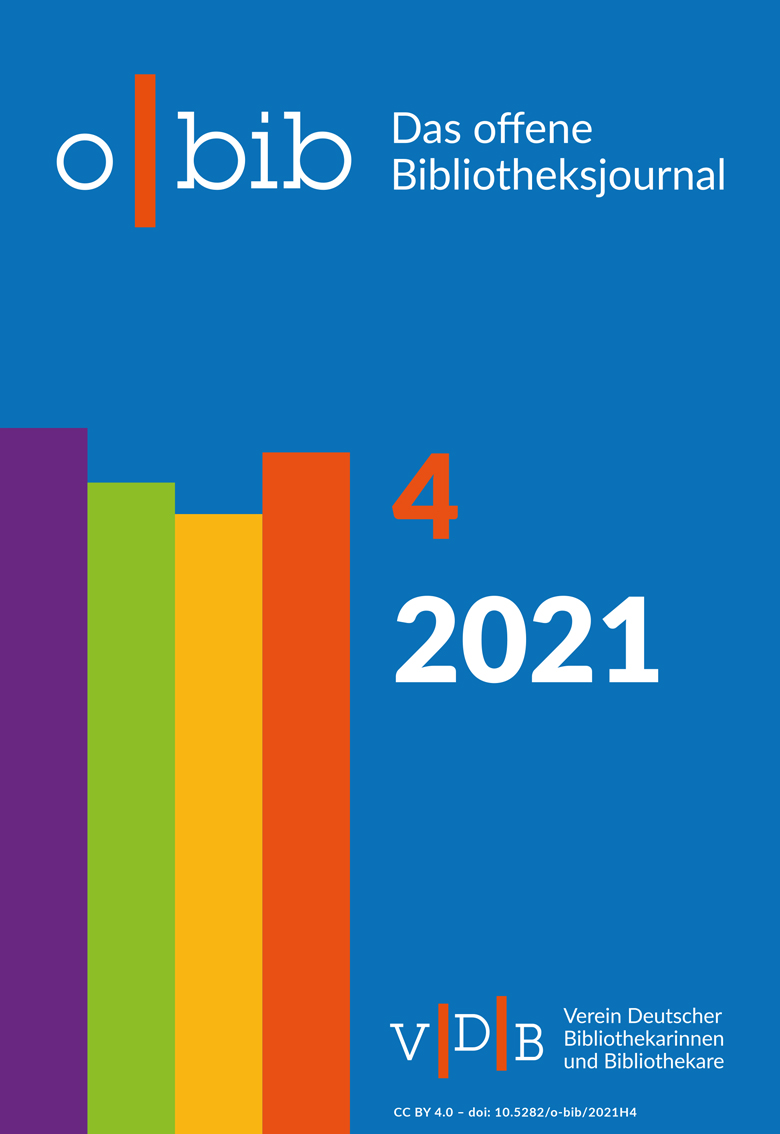A first metadata schema for learning analytics research data management
DOI:
https://doi.org/10.5282/o-bib/5735Keywords:
Metadata, Learening analytics, Research data managementAbstract
In most cases, research data builds the ground for scientific work and to gain new knowledge. Learning analytics is the science to improve learning in different fields of the educational sector. Even though it is a data-driven science, there is no research data management culture or concepts yet. As every research discipline, learning analytics has its own characteristics, which are important for the creation of research data management concepts, in particular for generalization of data and modeling of a metadata model. The following work presents our results of a requirements analysis for learning analytics, in order to identify relevant elements for a metadata schema. To reach this goal, we conducted a literature survey followed by an analysis of our own research about frameworks for evaluation of collaborative programming scenarios from two universities. With these results, we present a discipline-specific scientific workflow, as well as a subject-specific object model, which lists all required characteristics for the development of a learning analytics specific metadata model for data repository usage.
References
Allan, Robert: Virtual Research Environments. From portals to science gateways, Oxford 2009.
Bergner, Yoav: Measurement and its Uses in Learning Analytics, in: Lang, Charles; Siemens, George; Wise, Alyssa et al.: Handbook of Learning Analytics, 2017, pp. 34-48. Online: https://doi.org/10.18608/hla17.
Biernacka, Katarzyna; Pinkwart, Niels: Opportunities for Adopting Open Research Data in Learning Analytics, in: Tomei, Lawrence; Azevedo, Ana; Azevedo, José Manuel et al. (ed.): Advancing the Power of Learning Analytics and Big Data in Education, 2021, pp. 29–60. Online: https://publications.informatik.hu-berlin.de/archive/cses/publications/Opportunities-for-Adopting-Open-Research-Data-in-Learning-Analytics.pdf.
Blumesberger, Susanne: Repositorien als Tools für ein umfassendes Forschungsdatenmanagement, in: Bibliothek Forschung und Praxis 44 (3), 2020, pp. 503–511.
Calvet Liñán, Laura; Juan Pérez, Ángel Alejandro: Educational Data Mining and Learning Analytics: differences, similarities, and time evolution, in: RUSC. Universities and Knowledge Society Journal 12 (3), 2015. Online: http://dx.doi.org/10.7238/rusc.v12i3.2515.
Cremer, Fabian; Engelhardt, Claudia; Neuroth, Heike: Embedded Data Manager – Integriertes Forschungsdatenmanagement. Praxis, Perspektiven und Potentiale, in: Bibliothek Forschung und Praxis 39 (1), 2015, pp. 13–31.
Dewey-Dezimalklassifikation und Register: DDC 22 (german edition), founded by Melvil Dewey, Joan S. Mitchell et al. (eds.), 2 volumes, München 2005.
Drachsler, Hendrik; Greller, Wolfgang: Privacy and analytics, in: Gašević, Dragan; Lynch, Grace; Dawson, Shane et al. (eds.): Proceedings of the Sixth International Conference on Learning Analytics & Knowledge - LAK ‘16, New York 2016, pp. 89–98.
Hawlitschek, A., Berndt, S., Schulz, S.: Current Landscape of Empirical Research on Pair Programming in Higher Education. A Literature Review, in: Computer Science Education, 2021. [submitted]
Kecher, Christoph; Salvanos, Alexander; Hoffmann-Elbern, Ralf: UML 2.5. Das umfassende Handbuch, Bonn 20186.
Koedinger, K.R.: A Data Repository for the EDM Community. The PSLC DataShop, in: Romero, C., Ventura, S., Pechenizkiy, M., Baker, R. (ed.): Handbook of Educational Data Mining, Boca Raton 2011, pp. 43–55. Online: https://doi.org/10.1201/b10274.
Kowalczyk, Stacy T.: Where Does All the Data Go: Quantifying the Final Disposition of Research Data, in: Proceedings of the American Society for Information Science and Techno¬logy 51 (1), 2014, pp. 1–10. Online: https://doi.org/10.1002/meet.2014.14505101044.
Lee, Lap-Kei; Cheung, Simon K. S.; Kwok, Lam-For: Learning analytics. Current trends and innovative practices, in: Journal of Computers in Education 7 (1), 2020, pp. 1–6. Online: https://doi.org/10.1007/s40692-020-00155-8.
Leitner, Philipp; Khalil, Mohammad; Ebner, Martin: Learning Analytics in Higher Education – A Literature Review, in: Pena-Ayala, Alejandro (ed.): Learning Analytics. Fundaments, Applications, and Trends, 2017, pp. 1–24. Online: https://doi.org/10.1007/978-3-319-52977-6.
Obionwu, Victor; Broneske, David; Hawlitschek, Anja et al.: SQLValidator – An Online Student Playground to Learn SQL, in: Datenbank-Spektrum, 2021. Online: https://doi.org/10.1007/s13222-021-00372-0.
Ohaji, Isaac K.; Chawner, Brenda; Yoong, Pak: The role of a data librarian in academic and research libraries, in: Information Research 24 (4), 2019. Online: http://informationr.net/ir/24-4/paper844.html.
Rowley, Jennifer: The wisdom hierarchy. Representations of the DIKW hierarchy, in: Journal of Information Science 33 (2), 2007, pp. 163–180. Online: https://doi.org/10.1177%2F0165551506070706.
Saake, Gunter; Sattler, Kai-Uwe; Heuer, Andreas: Datenbanken: Konzepte und Sprachen, Frechen 20186.
Semeler, Alexandre Ribas; Pinto, Adilson Luiz; Rozados, Helen Beatriz Frota: Data science in data librarianship. Core competencies of a data librarian, in: Journal of Librarianship and Information Science 51 (3), 2019, pp. 771–780.
Shumaker, David: The embedded librarian. Innovative strategies for taking knowledge where it’s needed, Medford 2012.
Wolff, Ian; Broneske, David; Köppen, Veit: FAIR Research Data Management for Learning Analytics, in: Lingnau, Andreas (ed.): Proceedings of DELFI Workshop 2021, Bottrop 2021, pp. 158–163. Online: https://repositorium.hs-ruhrwest.de/frontdoor/index/index/docId/733.
Wilkinson, Mark D.; Dumontier, Michel; Aalbersberg, I. Jsbrand Jan et al.: The FAIR Guiding Principles for scientific data management and stewardship, in: Scientific data 3, 2016. Online: doi: 10.1038/sdata.2016.18.
Zug, Sebastian; Dietrich, André; Rudolf, Galina; Treumer, Jonas: Teamarbeit lernen – im Team lernen. Gruppenorientiertes Arbeiten in der Informatik, in: ACAMONTA 27, 2020, pp. 84–87. Online: https://tu-freiberg.de/sites/default/files/media/freunde-und-foerderer-der-technischen-universitaet-bergakademie-freiberg-ev-6089/pdf/acamonta2020/acamonta_webversion_verlinkt.pdf.
Downloads
Published
Issue
Section
License
Copyright (c) 2021 Ian Wolff, David Broneske, Veit Köppen

This work is licensed under a Creative Commons Attribution 4.0 International License.





